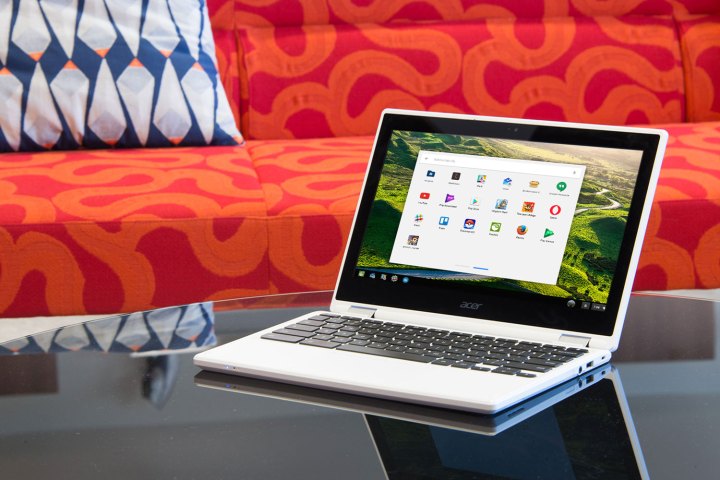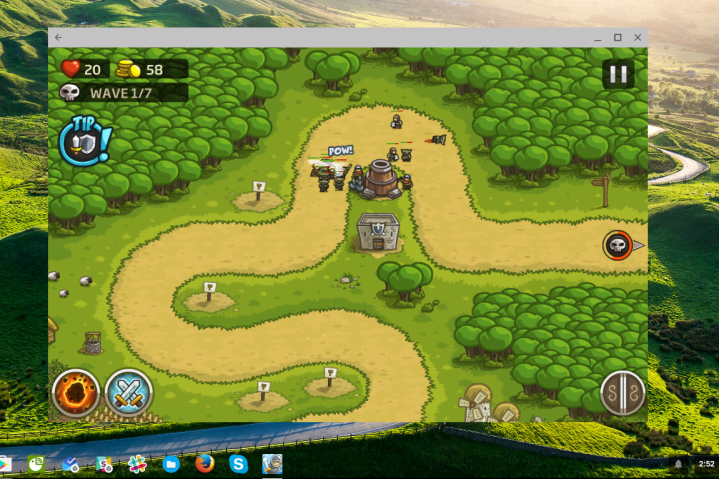
As it happens, I recently reviewed the Chromebook R 11, and Digital Trends still has it kicking in our closet full of laptops. Jealous of all the cool screenshots I saw on Twitter, and curious about how well Android apps work on the platform, I decided to switch the OS to Developer builds and take a look for myself.
Android apps are the new normal
When I started up the latest development build of Chrome OS, one thing stood out: Google sees Android apps as the future. All of your old Chrome apps have a tiny Chrome icon overlaying them in the bottom-right corner, as though to signify their second-class status. Android apps get no such icon.
But I’m getting ahead of myself. Google Play can now be found in the icon bar, and it works exactly the way it does on Android devices.

You can browse and download apps. The results are not added to your icon bar, but can be quickly found in the Search menu once installed. From there you can drag them to the icon bar, if you wish, or just launch them.
Skype calls on a Chromebook, and so much more
I think most Chromebook users have at least one thing they’d like to do regularly, but can’t. For me, it’s making Skype video calls. Bringing Android apps to Chrome OS fixes this, and many, problems. There’s a Skype app for Android, so I can finally make Skype video calls on a Chromebook.
These new applications also give a purpose to the touchscreen on the Acer Chromebook R11.
These new applications also give a purpose to the touchscreen on the Acer Chromebook R11. In our review, we noted the touchscreen didn’t add much to Chrome OS. With Android apps so easily in reach, however, there are suddenly all sorts of great users for the touchscreen.
I flipped the screen over and did some reading with Google Newstand and FeedMe, two applications I used regularly on my phone. They worked seemlessly, and looked great on the bigger screen. And I did a little gaming too, firing up Kingdom Rush and Jetpack Joyride. Both games worked without much difficulty, though Kingdom Rush didn’t really like it when the Chromebook switched orientations from horizontal to vertical.
I also finally got a decent browser to work on Chrome OS.

I kid, of course, but being able to install Firefox at all is a radical change for Chrome OS. Instead of the Chrome browser being central to everything, a wide variety of third party applications are available for download. It really changes the experience of using a Chromebook. In fact, the name — “Chromebook” — now seem a bit inappropriate. Chrome is no longer the system’s portal to everything. It’s just another app.
Having said that, Android apps on Chrome OS aren’t perfect.
One ecosystem grafted onto the other
Android apps work great while using a touchscreen, but feel out of place when you use a touchpad or mouse. Try to select text, for example, and you can’t click and drag the cursor — you need to tap and hold, the way you would on a mobile device. This wasn’t as much a problem on our Acer Chromebook R11, which has a touchscreen — but most Chromebooks don’t.
Shortcomings like these periodically remind you that Android apps aren’t quite native to Chrome OS.
Windows management is also a little weird. In Chrome OS, you can drag any window to the side of the screen to make it take up half the display. Try to drag an Android app, however, and nothing happens. You also can’t manually re-size Android apps. You can maximize these apps, and toggle them back to their previous predetermined size, but that’s it.
Shortcomings like these periodically remind you that Android apps aren’t quite native to Chrome OS. They’re grafted on.
Sometimes, this can get downright confusing. There are, for example, two versions of Slack on my Chromebook.
I know that one is the Android version, and other is the Chrome version. But that kind of dual-thinking is a lot to ask from everyday users, who shouldn’t need to care about Google’s various platforms. To those users, this is just confusing.
Pokémon no-go: the apps aren’t filtered by what’s working
Naturally, I wanted to install Pokémon Go on a Chromebook, because I know how cool I would look, out in public, throwing Pokéballs at a Pidgey on a full-blown laptop. It’s the dream, really.
I was thrilled to see Pokémon Go is seemingly supported on my Chromebook, at least so far as Google Play is concern. The app store let me download the game, and when I fired it up the music started playing. I was getting psyched. Then came the words “GPS Signal Not Found,” and everything crashed.

I knew it was ridiculous to try to load this game on a Chromebook. There’s no GPS, no rear-facing camera, and no cell connectivity. But in order to avoid confusing users, apps that don’t work on Chrome OS need to be filtered out. As annoying as this situation was, it’d be even worse if I’d tried it with an app that’s not free.
An impressive start, but needs refinement
I can understand why Google is bringing Android apps to the Chromebook. The web, as a platform, just isn’t enough.
It’s a lesson tech companies keep learning again and again. Steve Jobs initially announced the iPhone didn’t need apps, because the web would fill the void. A year later Apple gave up on that, launched the App Store, and the rest is history. Firefox OS, Jolicloud, and Nokia’s MeeGo all tried and failed to build a platform around web apps.
Now, Google is giving up, too. The Chrome Web Store tried for years to turn web apps into a platform, but it stagnated. Google Play, meanwhile, is massive, and instantly fills in thousands of Chromebook holes. Games, Microsoft Office, and so much more have suddenly become available.
The downside, of course, is that those applications were designed with phones and tablets in minds, not laptops. Android compatibility is a step in the right direction, but it’s a long ways from becoming a feature anyone can use with ease.

